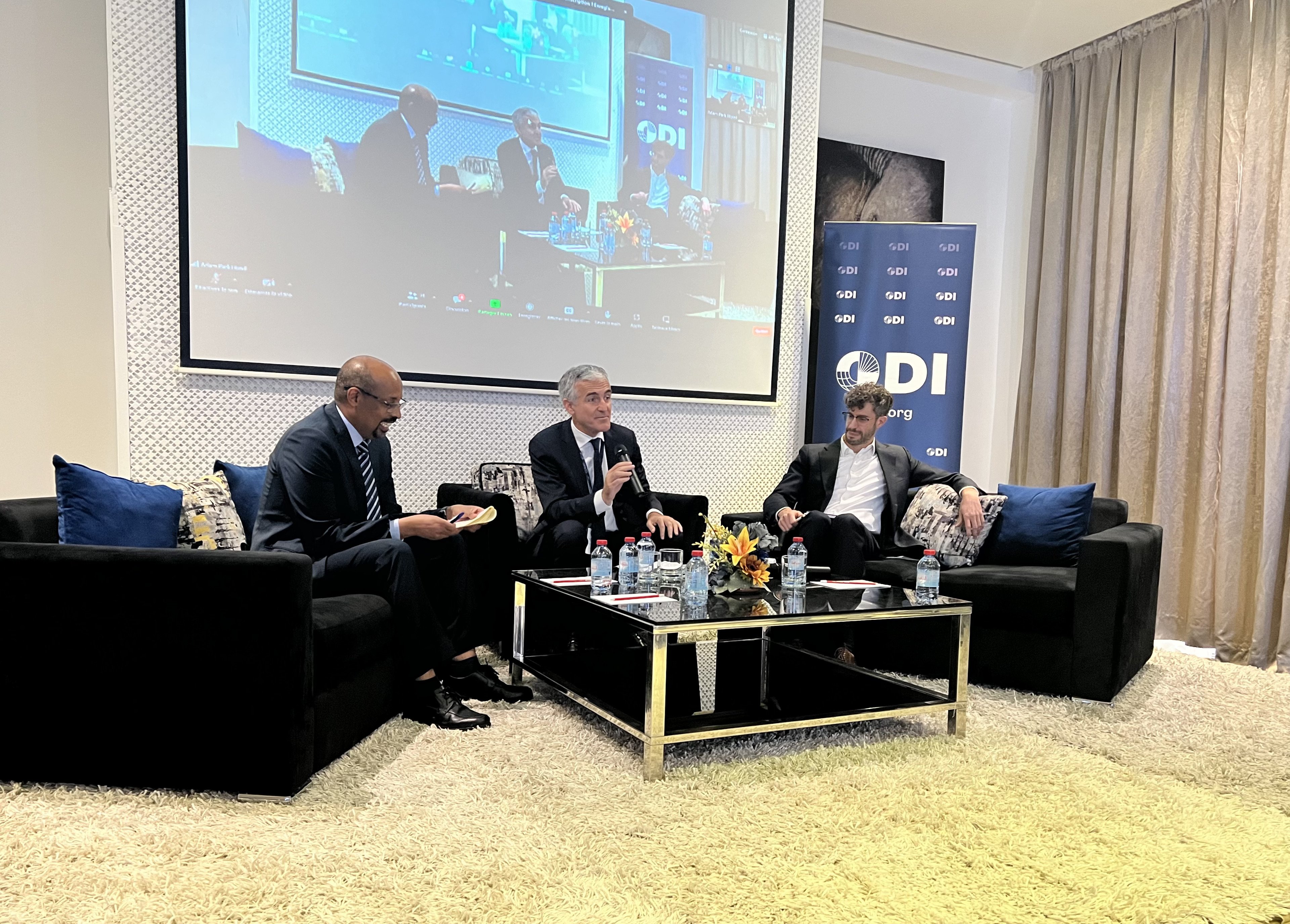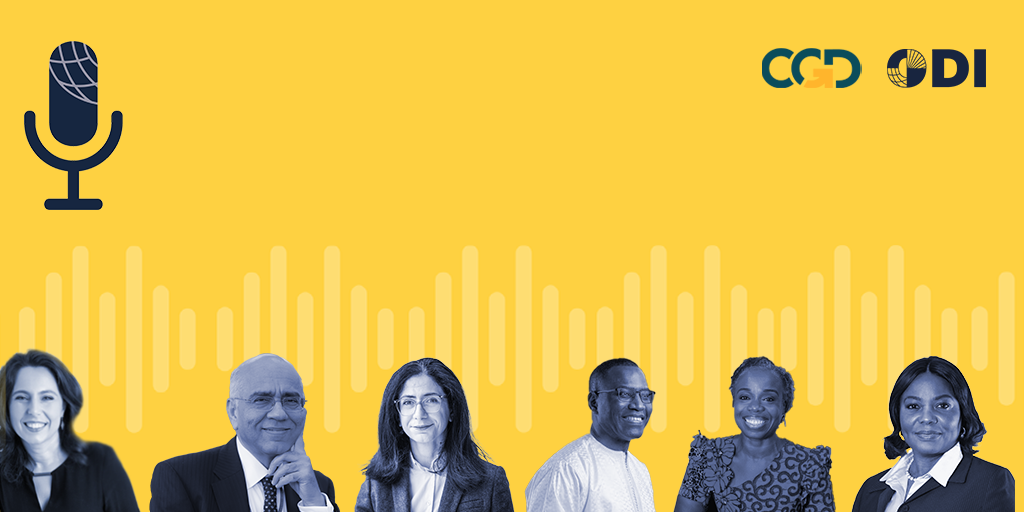Hello and welcome back to the MDB Insights newsletter.
Normal service has (more or less!) resumed at ODI following a busy programme on the margins of the 2023 IMF/World Bank Annual Meetings in Marrakech.
Published while the Meetings were in full swing, our timely new blog looks at the latest update of the World Bank's Evolution Roadmap: where there has been progress, where more needs to be done, and key priorities for its implementation. Also in this edition of the newsletter: our assessment on the key gains from the Meetings and what ought to be prioritised ahead of next year’s Spring Meetings, as well as a recap of ODI’s events programme in Marrakech. And if you haven’t already, check out our podcast on MDB reform from the perspective of client countries.
The verdict: solid results, but still some way to go
The terrible earthquake in Morocco that formed the backdrop of this year’s Annual Meetings threw into stark relief the scale of the challenges we collectively face in this age of ‘poly-crisis’. In this sense, it was imperative that as the Meetings drew to a close, the major stakeholders could point to tangible progress that might offer some hope for the future. What, then, were this year’s key achievements? And which priority areas still require urgent attention before next year’s Spring Meetings?
The good news…
- The World Bank Group’s Board of Governors endorsing the Evolution Roadmap, including a new vision and mission (‘Ending poverty on a liveable planet’), was a big step forward.
- In another encouraging development, World Bank President Ajay Banga, World Bank management and other stakeholders committed to reforming World Bank Group processes and bureaucracy, which included a pledge to reduce the process/approval time of World Bank projects by a third.
- A first-of-its-kind joint statement from the Heads of MDBs prioritised five areas where MDBs can work better as a system.
- There was a fair amount of support from G20 members and MDB heads for the G20 Independent Expert Group’s proposals for strengthening MDBs.
- There is clear momentum from both shareholders and now most MDB finance teams to push ahead with adding value from MDB callable capital. The broader MDB capital adequacy reform agenda is also progressing, while systematic and collective discussions are afoot between MDBs and credit rating agencies on possible reforms to rating methodologies.
On the to-do list…
- Achieving a strong start to the IDA21 replenishment. Among other actions, this includes: reversing flat donor contributions to IDA, reviewing needs for the crisis response window and incorporating vulnerability into the IDA framework.
- Finalising a first-of-its-kind scorecard applicable across the World Bank Group.
- Making progress on both streamlining operations (as outlined in the new playbook – see above) and on the review of the World Bank Group’s knowledge function.
- Translating the principles of the concessionality framework as approved by the World Bank Group’s Board of Governors into incentives and modalities for global public goods and global challenges.
- Making headway on implementing the recommendations included in the G20 Independent Review of MDBs’ Capital Adequacy Frameworks beyond just the World Bank Group, with a particular focus on lowering the equity/loan ratio and maximising the value of callable capital.
The Evolution Roadmap, one year on: what next for the World Bank?
It has been a year since shareholders entrusted World Bank management with the task of reforming the institution’s mission, operations and finances to equip it with the tools to tackle the major global challenges of the 21st century. Despite lingering geopolitical tensions, work on the Evolution Roadmap has advanced at a good pace.
Our latest blog takes a look at what else the Roadmap got right in its update – as well as the areas that could be further improved.
ODI at the Annual Meetings
How can MDBs be more responsive to borrower clients and citizens? What are the effects of global shocks on African economies? How are ongoing issues around conflict and fragility undermining efforts to reform the multilateral development agenda?
These are just a few of the questions we tackled as part of our packed events programme on the margins of this year’s Meetings…
How can MDBs be more responsive to borrower clients and citizens? Improving the operational model
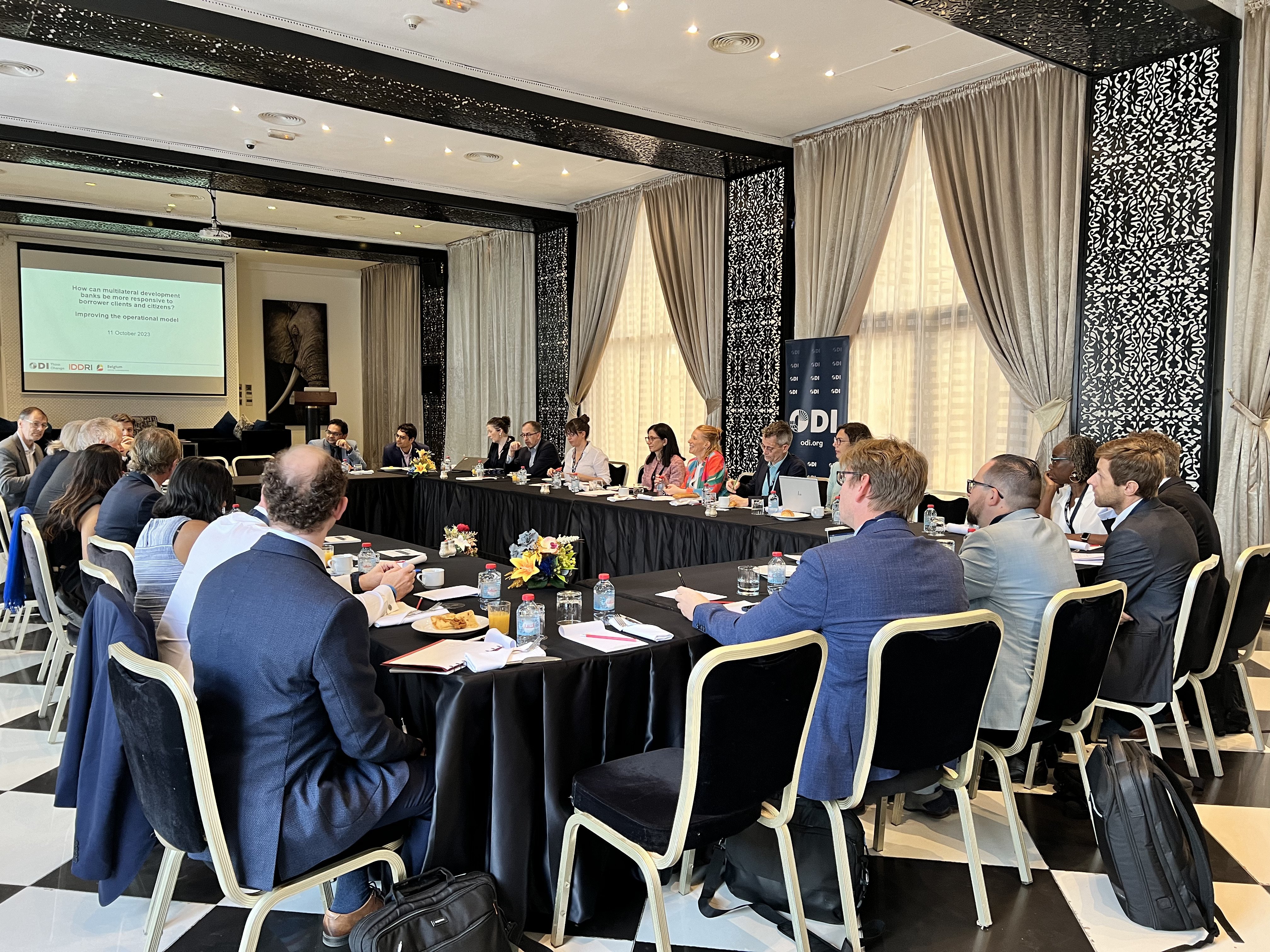
On Wednesday 11 October, we hosted a roundtable discussion in partnership with IDDRI (L’Institut du développement durable et des relations internationales) and the Belgian Ministry of Foreign Affairs on how MDBs can improve their operational model. Several key stakeholders were in attendance, including MDB shareholders and representatives from client countries, civil society organisations, academia and think tanks. Here were some of the main talking points:
- MDBs need to align with the national and regional priorities of recipient countries, as well as strengthen the expertise of MDB staff and national stakeholders, to develop and implement projects
- MDBs should also seek various levels of cooperation and further harmonise processes and standards to speed up implementation
- Making the MDB operational model better necessarily implies management and shareholders taking more risks
You can read a more detailed summary of this closed-door event here under the Chatham House rule.
Maximising the developmental value of MDB callable capital
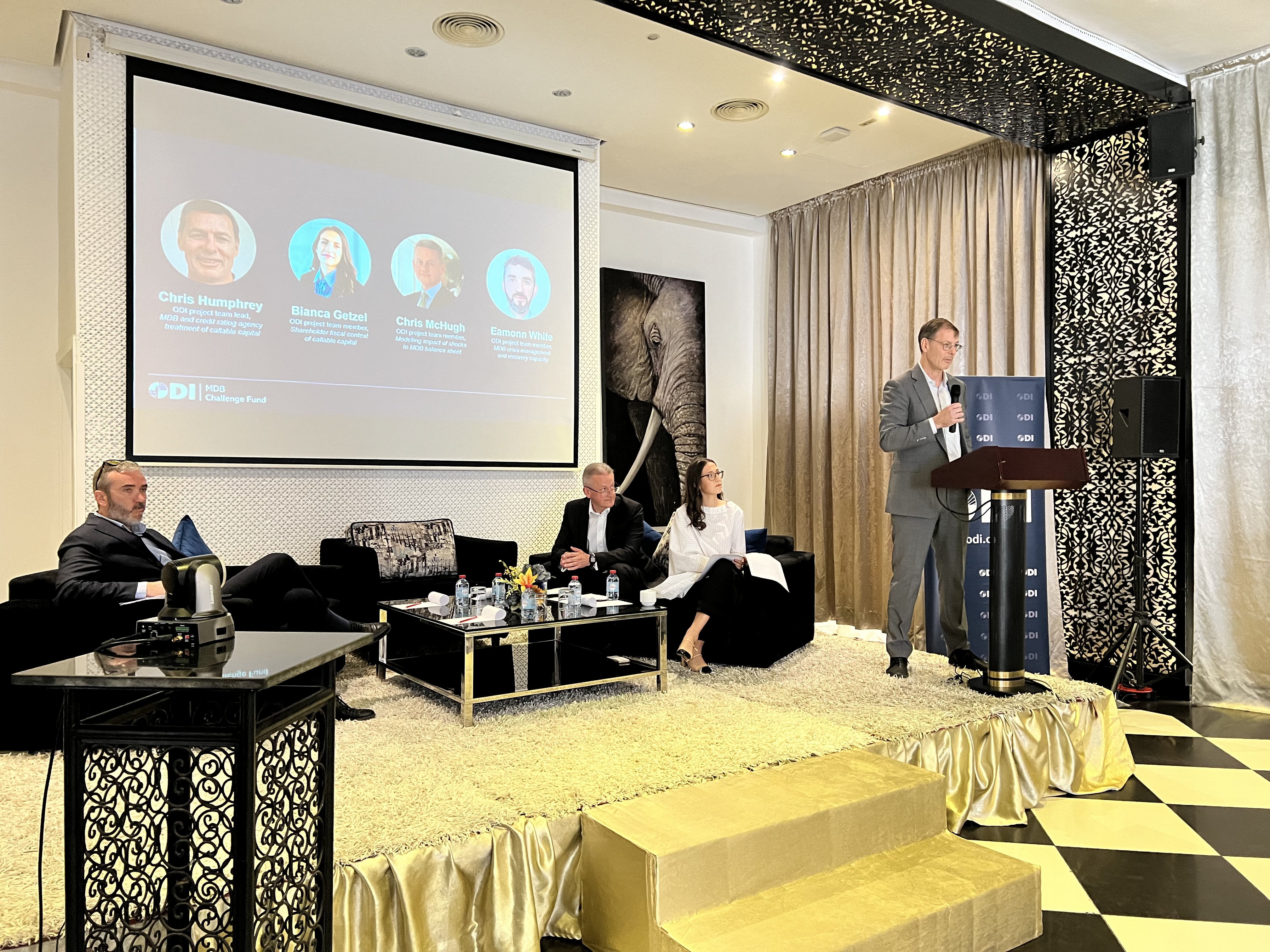
A busy Wednesday continued with a workshop on the potential of MDB callable capital to increase lending capacity: a central recommendation of the G20 MDBs’ Capital Adequacy Frameworks report (to which ODI's Hans Peter Lankes and Chris Humphrey both contributed). The workshop began with a presentation by the ODI project team (Chris Humphrey, Bianca Getzel, Chris McHugh and Eamonn White) that laid out initial research findings in a number of areas related to callable capital and explained future research directions. This was followed by panel members Kathrin Muehlbronner (Moody's), Phil Stevens (UK Foreign, Commonwealth and Development Office) and Erik Berglöf (Asian Infrastructure Investment Bank) offering their own reflections on callable capital and responding to audience questions. The event was very well attended and included high-level policy-makers from shareholder governments such as the US, the UK and Japan, as well as MDB management.
Resilience-building in Africa: navigating shocks and policy implications
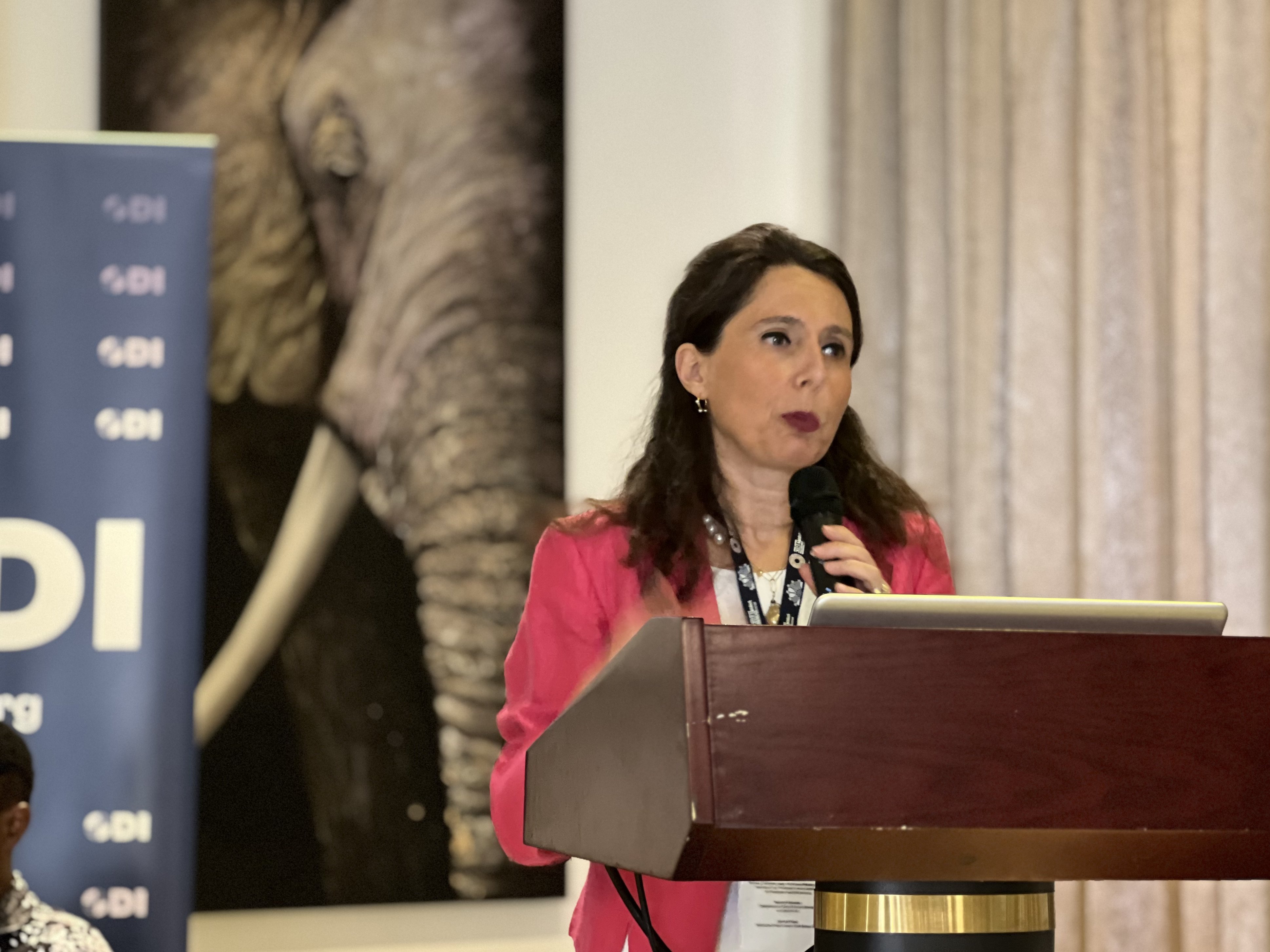
A joint collaboration between ODI and the International Development Research Centre (IDRC) – and drawing on research funded by the IDRC and conducted alongside organisations such as the African Economic Research Consortium, the Economic Research Forum and Partnership for Economic Policy – this event convened representatives from the World Bank, the IMF and Global South think tanks, who largely agreed on the need for stronger African integration and implementation of the African Continental Free Trade Area to build resilience against external shocks and enhance economic growth. Key discussion points included how women are disproportionately affected by crises such as the Russia-Ukraine conflict and how trade corridors could help empower women economically.
The Global South think tank representatives in attendance advanced messages on the importance of resilience-building in Africa and industrial policy in response to crises. Notably, while the World Bank appeared open to exploring industry-led recovery strategies, the IMF is only beginning to do so –signalling that more work is needed to effectively engage with the organisation. Further research was also deemed critical, such as analysing the financial and monetary transmission channels through which crises impact African economies. The event recording is available to watch on odi.org.
Navigating fragility: the new multilateral agenda
Co-organised with the International Growth Centre State Fragility Initiative (IGC SFI), the aims of this event were fourfold: to put the spotlight on fragility, conflict, and violence (FCV) as a global challenge for the international community, focusing specifically on how to leverage ongoing MDB reform processes to promote the mitigation of FCV in its many forms; to challenge the view that there is a trade-off between focusing on the climate and fragility; to exchange thinking and share experiences around the causes of state-level fragility and the effective strategies for scaling up support for countries experiencing fragility in its many forms; and to identify knowledge gaps and potential new research pertaining to the causes of state-level fragility of different kinds.
Strong in-person and online attendance was buttressed by a panel that included Ellen Johnson Sirleaf, Donald Kaberuka, Alexia Latortue (US Treasury) and Martin Raiser (World Bank), with Sara Pantuliano, Hans Peter Lankes (ODI) and Abdi Ali (IGC SFI) moderating. Post-event reactions, including from established donors in the field, were highly encouraging: there is appetite to build momentum through further analyses (e.g. how the World Bank might best design a Global Challenges Programme on FCV) and through a follow-up event series that would drill down into key aspects of the problem. If you missed it, you can watch the event here.
Strengthening MDBs: the triple agenda
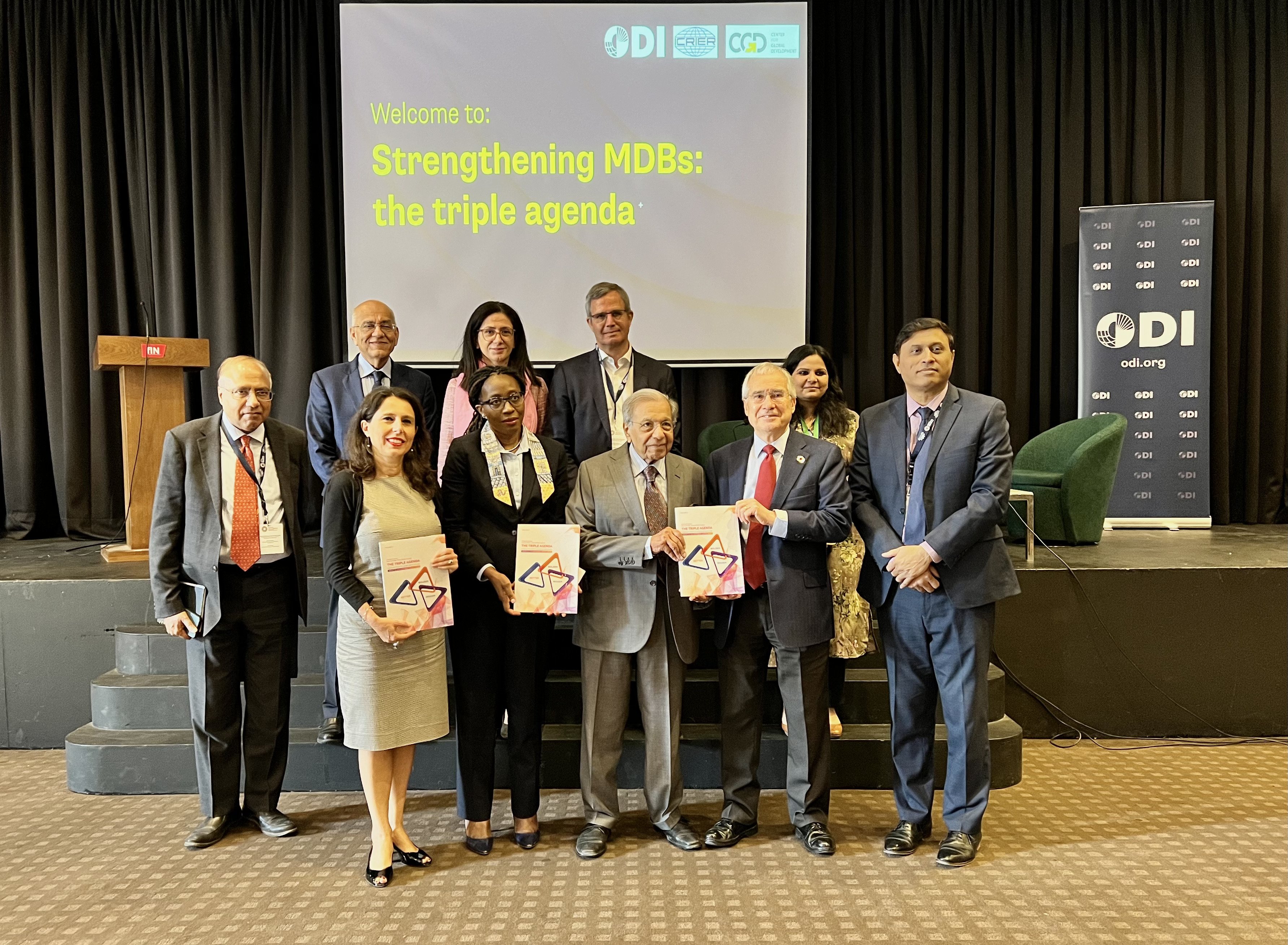
Our final event of the week – co-organised with ICRIER and the Center for Global Development – was a high-level discussion marking the public launch of the G20 Independent Expert Group’s reports on strengthening MDBs (which ODI’s Hans Peter Lankes and Annalisa Prizzon helped to deliver).
Masood Ahmed (President, Center for Global Development) and Deepak Mishra (Director and Chief Executive, ICRIER) made some opening remarks to a room of more than 100 high-level invitees from governments, MDBs, foundations and civil society organisations. This was followed by a panel discussion featuring NK Singh (President, Institute of Economic Growth & Chairperson, Fifteenth Finance Commission of India), Vera Songwe (former Executive Secretary, Economic Commission for Africa) and Professor Nicholas Stern (London School of Economics), with ODI Chief Executive Sara Pantuliano moderating.
The discussion focused on the need for MDBs to become better, bolder and bigger institutions by working as a system, engaging with countries, delivering on the SDGs and the Paris Agreement, and increasing private sector investment. The panel responded to audience questions on aspects of the report including the country and currency risks, international collaboration on global challenges, and private and domestic finance mobilisation.
Click here to watch the full event.
What do borrowing countries think of MDB reform?
The demands and preferences of client countries should, in principle, inform and shape the lending volumes, strategies and operations of MDBs.
But in reality, we know little about these preferences, what client countries value about MDBs, and what they think the banks’ weaknesses are – potentially curbing their demand for assistance in the medium to long term.
MDBs will only succeed in delivering the triple mandate of eliminating extreme poverty, boosting shared prosperity and contributing to global public goods as recommended by the IEG if they can learn how to effectively serve and work with client countries that have different institutional capabilities and evolving priorities.
With much work evidently still to be done, this episode of ODI’s Think Change podcast – produced in collaboration with the Center for Global Development – explores the issue of MDB reform from the perspective of borrowing countries.
Joining ODI chief executive Sara Pantuliano are:
- Masood Ahmed – President, Center for Global Development
- Amadou Hott – Special Envoy for the Alliance for Green Infrastructure in Africa, African Development Bank & former Minister of Economy, Planning and Cooperation, Senegal
- Iyabo Masha – Director and Head of Secretariat, G24
- Mavis Owusu-Gyamfi – Executive Vice President, African Center for Economic Transformation
- Annalisa Prizzon – Principal Research Fellow, ODI
Connect with us
You can stay up-to-date with our latest analysis on MDB reform by visiting our dedicated webpage.
